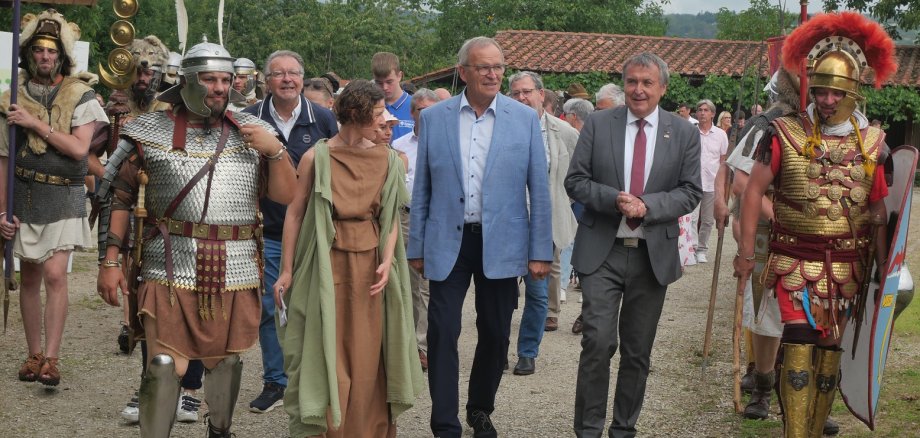22 January became a memorable day in 1963, because on that Tuesday, Federal Chancellor Konrad Adenauer and French President Charles de Gaulle signed the Franco-German Élysée Treaty. With their signatures, they sealed the Franco-German friendship. The treaty was decisive for the historic reconciliation of the two countries after the Second World War and the binational relations in politics and society can still be traced back to it today. In 2019, it was time to forge an even closer alliance between Germany and France and put the Franco-German friendship at the service of a strong and effective Europe. French President Emmanuel Macron and former German Chancellor Angela Merkel also signed a treaty to this end on a Tuesday, 22 January 2019, the Aachen Treaty, which is also known as the "little Élysée Treaty" and formally came into force a year later. 22 January is celebrated as the day of Franco-German friendship and cooperation.
The Saarpfalz district and its citizens have their own moving history - documented many times - with their immediate neighbour France - in social, political and economic terms.
The Saarpfalz district has been linked to the Département de la Moselle by a partnership that has now lasted over twenty years since April 2002. From the very beginning, the aim of the cooperation was to expand and intensify cross-border cooperation in the long term, for example by deepening institutional cooperation and networking the natural and cultural offerings.
Today, this applies 100 per cent to the "European Cultural Park Bliesbruck-Reinheim" (EKP). Also noteworthy here: building a bridge to the Aachen Treaty.
The EKP was created over 30 years ago on German and French soil through cross-border action. In its exemplary development, however, those responsible at the Saarpfalz-Kreis and the Département Moselle ultimately came up against their organisational and legal limits, which are sometimes enshrined in law books. So the Aachen Treaty came not a day too soon. It recognised the special role of local authorities in cross-border cooperation and the need to remove obstacles in everyday life through neighbourly solutions. And so, on the basis of the Treaty of Aachen, new opportunities for international cooperation in the European Cultural Park have arisen, which the Saarpfalz district and the Département de la Moselle have immediately capitalised on with a view to the future.
On 15 September 2022, "VITA FUTURA Bliesbruck-Reinheim" was founded, a cross-border association under French law. The aim of this association is to establish a structure that will help to better integrate the existing administrative units and facilitate cooperation between the administrative authorities. "The cultural park is ideally suited as a laboratory for neighbourly Franco-German cooperation. It represents a space in which new solutions can be tested, based on the possibilities opened up by the Aachen Treaty," emphasises Stefan Munz, Managing Director of the European Cultural Park Foundation.
District Administrator Dr Theophil Gallo, who will take over the office of President of Vita Futura from Patrick Weiten, President of the Conseil départemental de la Moselle, at the last board meeting of the association, is also very proud of this and once again refers to the idea of the Weimar Triangle, which was created in 1991 at a meeting of the foreign ministers of the three countries Germany, France and Poland: "These three geographically close countries can form the core element and stability factor for Europe, provided they work together in a consensual manner. This will certainly require a lot of work, but it is worth it in the interests of a strong Europe as a guarantor of peace on our continent. The three nations that form the Weimar Triangle are the nucleus of a united Europe, and not just from a geographical point of view, which is why people need to be brought closer together. This idea should also play a role in this year's European elections. I am delighted that we are celebrating Franco-German friendship on 22 January. It is a great asset for our social and political life in Europe. "
In order to bring people closer together, but also against the backdrop of the Russian war of aggression in Ukraine, the "International Alliance for Peace and Cohesion in Europe", the "Homburg Alliance", was formed on 4 July 2022 on the initiative of District Administrator Dr Gallo. The "Homburg Alliance" is the only one of its kind in Europe and has 24 signatures. They come from the presidents of the neighbouring French department of Moselle, the three district umbrella organisations in Poland, Ukraine and Germany, the European umbrella organisation CEPLI, EuRegio SaarLorLux+, the US partner district of Henrico County/Virginia, the district of Neunkirchen and seven Polish and eight Ukrainian districts. They all support the alliance in order to promote mutual support and cohesion. Under the umbrella of the Homburg Alliance, there will also be an event entitled "Homburg Europe Talks" on 16 March, to which the former long-standing Luxembourg Foreign Minister Jean Asselborn and Heiko Maas, Federal Foreign Minister from 2018 to 2021, have confirmed their attendance.
Under the motto "European and cosmopolitan", contacts and friendships across borders are being practised more than usual in the Saarpfalz district. The international exchange activities are coordinated and made visible by the "European and Partnership Office" under the direction of Dr Violetta Frys.
Information on the district partnerships and the Saarpfalz district's European work can be obtained from the Saarpfalz district's European Affairs Officer, Dr Violetta Frys, by calling (06841) 104-8273 or sending an e-mail to [email protected] or [email protected].
